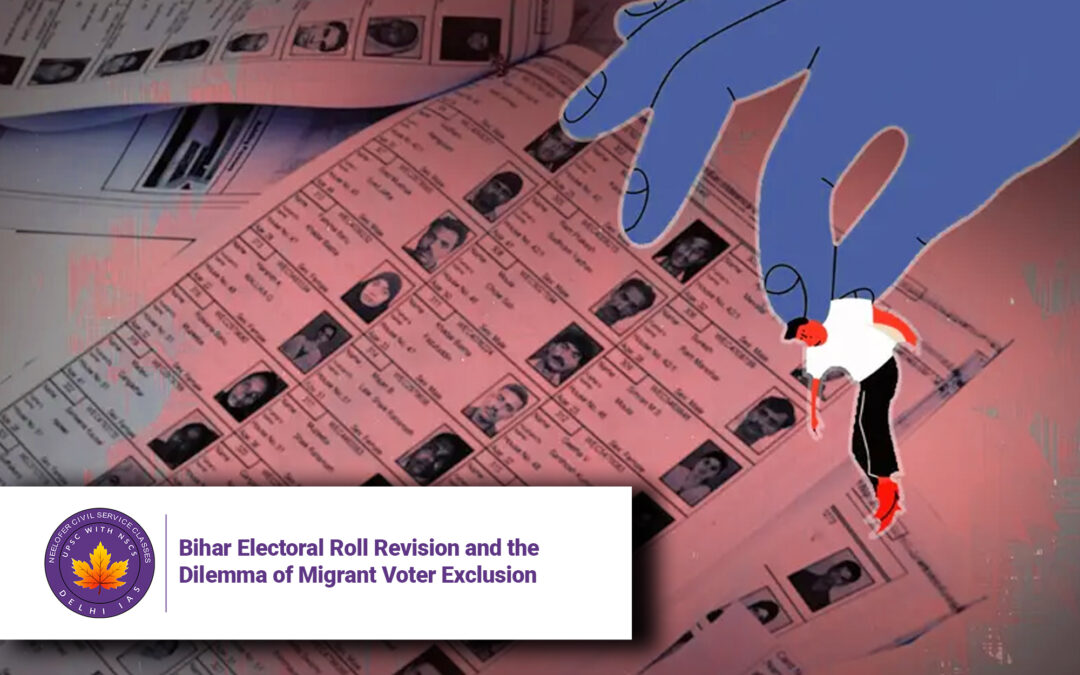Bihar Electoral Roll Revision and the Dilemma of Migrant Voter Exclusion
Why in News?
The Election Commission of India (ECI) has initiated a Special Intensive Revision (SIR) of electoral rolls in Bihar, triggering significant political and civic debate. The reason: a growing concern that the process may inadvertently or systematically lead to the disenfranchisement of a large segment of voters, particularly short-term and long-term migrant workers. This revision, if not handled with care, could compromise the voting rights of lakhs of Bihari citizens, altering the democratic landscape ahead of future elections.
Introduction
India’s democratic framework is celebrated for its scale, inclusiveness, and resilience. Central to this framework is the electoral process, which guarantees every eligible citizen the right to vote. However, the logistical and procedural complexities involved in maintaining accurate electoral rolls often lead to the marginalization of already vulnerable populations — in this case, Bihar’s migrant workers.
The Election Commission of India launched the SIR process to verify the electoral rolls in Bihar, a state known for its high rates of migration. The revision, meant to clean and update the voter list, has been met with skepticism, especially by Opposition parties. The core of the concern lies in the tight deadlines and the definition of “ordinary residents,” which, if narrowly interpreted, could cause millions to lose their voting rights.
Key Issues and Institutional Concerns
1. Exclusion of Short-Term Migrants
The electoral roll revision allows only “ordinary residents” to be verified for inclusion. According to ECI’s criteria, a person must be physically present for verification during the brief window ending on July 31. However, 20% of Bihar’s voters are estimated to be migrants, many of whom are temporarily away for work or other reasons. These individuals may be unable to return home during this period, risking their removal from the rolls.
2. Legal Provisions vs Practical Implementation
The Representation of the People Act, 1950, clarifies that a person’s temporary absence from their place of residence does not disqualify them from being treated as an ordinary resident. The law further explains that as long as the person has the intention to return, their status as a voter in their home constituency remains intact. Unfortunately, electoral roll officials may not uniformly interpret or apply this clause, potentially violating legal safeguards.
3. The Long-Term Migrant Dilemma
The situation becomes even more complicated for long-term migrants. These individuals, who may live and work in different states for extended periods, are no longer effectively represented in their home constituencies. For them, meaningful electoral participation would require shifting their voter registration to their current place of residence — something that is often neglected or discouraged due to bureaucratic hurdles or lack of awareness.
4. Bihar’s Unique Electoral Dynamics
Bihar exhibits a unique gender skew in electoral participation. As per the 2024 election data, more women turned out to vote than men, even though there were more male voters registered. For every 1,000 men, there were 1,017.5 women who voted. However, in terms of registered voters, for every 1,000 women, there were 917.5 men. This inverse ratio indicates that many male voters were registered in their home constituencies but failed to return on polling day, likely due to migration.
This is not merely a demographic curiosity — it highlights the structural challenge of ensuring that mobile male workers are not disenfranchised in the name of voter list cleanliness.
5. Insufficient Time and Lack of Sensitivity
The ECI has allocated just one month for this entire process, despite the known scale and complexity of Bihar’s migration patterns. Critics argue that such a short duration does not allow for sufficient outreach or verification, particularly in rural or remote areas where communication systems are weak and migrants’ families may not be able to advocate for their inclusion.
Challenges and the Way Forward
A. Balancing Accuracy with Inclusion
While the aim of the SIR process is to prevent duplication, ghost voters, or outdated entries, this goal must not come at the cost of democratic inclusion. Excluding legitimate voters due to bureaucratic rigidity defeats the very purpose of a democratic update.
B. Policy Reform for Migrant Voters
India lacks a cohesive policy framework for handling the voting rights of migrant populations. The existing system assumes that citizens vote where they were born or raised, ignoring the modern reality of economic migration. Reforms must allow for smoother transfer of voting rights, more awareness campaigns, and facilitation of voter registration in current places of residence.
C. Gender-Sensitive Electoral Management
The data from Bihar and similar states reveal that male migration significantly impacts voting patterns. Therefore, election planning must also take into account gendered patterns of migration and participation, with specific strategies to reach absentee male voters.
D. Longer Time Frame and Better Planning
One month is insufficient for an exercise of this scale. The ECI must consider a multi-phase verification process, possibly integrating technology, postal surveys, and longer ground-level outreach. Including civil society organizations and panchayat bodies can also aid in ensuring no group is left behind.
E. Migrant Worker Representation
Migrant workers form the economic backbone of many Indian states, especially Bihar. Their political voice must be protected if democracy is to be truly representative. Innovative solutions like remote voting, proxy voting, or portable voter IDs need urgent exploration and pilot testing.
Conclusion
Bihar’s Special Intensive Revision of electoral rolls is a critical process aimed at strengthening the democratic fabric of the state. However, the current design and implementation raise serious concerns about the exclusion of short-term and long-term migrant voters, who form a substantial portion of Bihar’s electorate.
While maintaining accurate and updated electoral rolls is important, it must not override the constitutional right to vote. The process must respect the legal provisions, acknowledge migration trends, and be conducted with sensitivity, inclusivity, and adequate time. If India is to uphold its democratic ideals, especially in states like Bihar that are deeply shaped by migration, reforms must go beyond administrative convenience and embrace social realities.
Q&A Section
1. Why is Bihar’s electoral roll revision under criticism?
Bihar’s Special Intensive Revision (SIR) by the Election Commission of India is being criticized for potentially excluding lakhs of migrant voters who are not physically present for verification. Opposition parties argue that the verification window is too short and the criteria too narrow, possibly disenfranchising legitimate voters.
2. What legal safeguards protect migrant voters in India?
The Representation of the People Act, 1950, ensures that temporary absence from one’s place of residence does not disqualify a person from being treated as an ordinary resident. As long as the voter has the intention to return, they should be retained on the electoral roll.
3. What are the challenges with long-term migrants in the electoral system?
Long-term migrants often live and work in places far from their registered constituencies. They may not update their voter registration due to systemic or personal hurdles, resulting in poor voter turnout and weak political representation for these communities.
4. How does migration affect gender dynamics in voting in Bihar?
Bihar shows a unique pattern where more women vote than men, despite there being more male voters registered. This is because many male voters, who are likely migrant workers, are unable to return to vote during elections, leading to a lower turnout.
5. What should the Election Commission do to make the electoral roll revision more inclusive?
The ECI should extend the timeline for the SIR process, adopt more flexible verification methods, and implement policy reforms for migrant workers. These include enabling easier voter registration in the current place of residence and considering technological solutions like remote voting.








